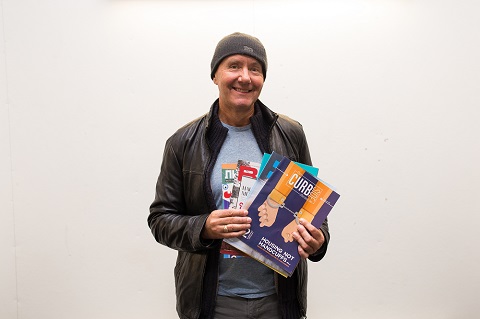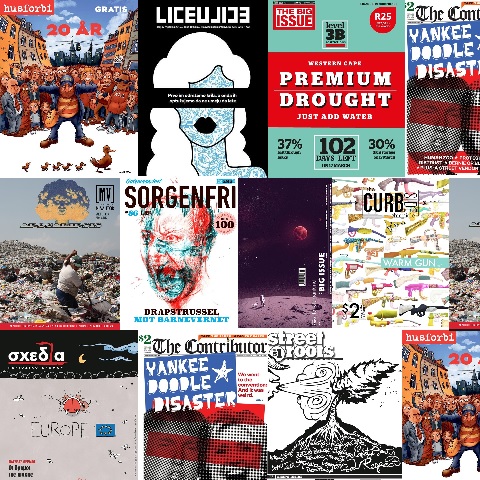“When you’re not doing so well, vote for a better life for yourself. If you are doing quite nicely, vote for a better life for others.”
So goes Irvine Welsh’s pinned tweet, put out into the world in May 2015, just three years ago – a time before Brexit; a time before Trump; a time that actually seems like a lifetime ago.
Welsh is no stranger to Twitter. When he’s not penning unrepentantly provocative prose, or relaxing by the sun, sea and sand of his currently adopted home of Miami, the uber successful Scottish writer can be witnessed, if one cursory glance at the social media site is evidence, airing his unfiltered views on everything from politics to social justice and, more light-heartedly but no less life-affecting, football.
That phrase sitting atop his Twitter profile also came before Welsh entered triumphantly back into the limelight – if indeed he ever left it – thanks to the release and inevitable success of T2: Trainspotting, the movie sequel to his best known work. The Leith born author has ridden that enduring success straight into the writing and publication of his new book, Dead Men’s Trousers, the fifth (and potentially last) novel centred around the main characters of the Trainspotting series – Renton, Sick Boy, Spud and Begbie.
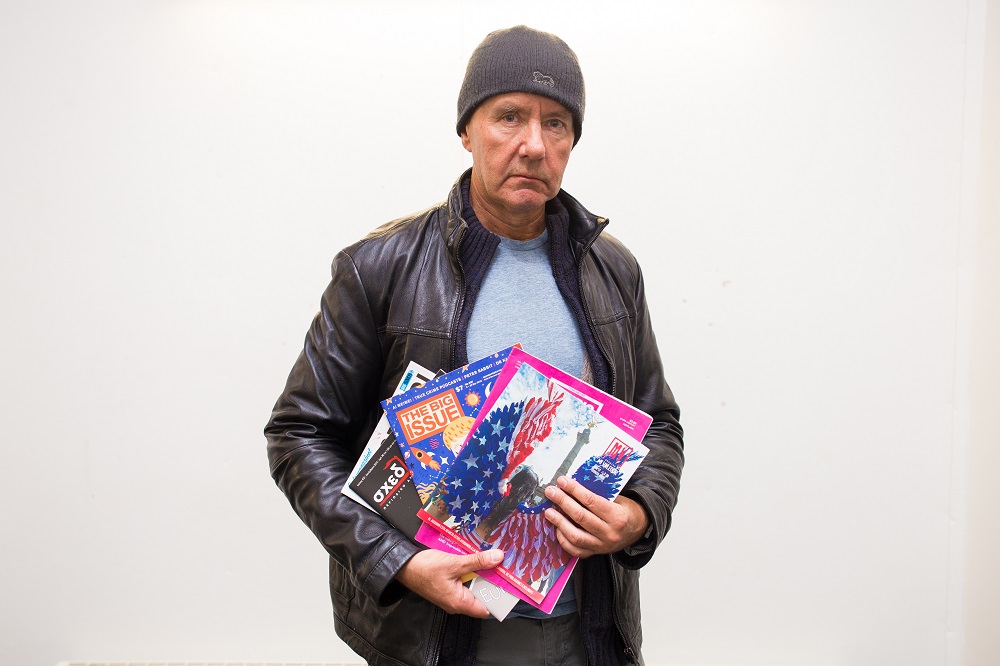
It doesn’t go unnoticed by street paper staff and vendors, a community within which Welsh is an extremely popular man, that part of the inspiration behind this recent surge of creativity is the exclusive Christmas story, revolving round a Begbie family get-together, he imagined up for the street paper network. Whether it reignited a passion to bring these characters to life once more, or simply got those writerly cogs going again, there’s no doubting Welsh has been on a roll since the short tale featured in 32 street papers across 16 countries throughout the world – with Welsh’s signature brand of scathingly humorous Scots even being translated into Trøndersk, a Norwegian dialect spoken in the city of Trondheim, home of the street paper Sorgenfri. When asked if INSP can take at least a little credit for his recent run, Welsh responds with an emphatic: “Absolutely!”
Returning to that tweet for a final time, it shows Welsh as an artist who understands people’s struggles and, as an INSP Ambassador since 2013, someone who empathises with, and fiercely advocates for, vulnerable people such as those who work as street paper vendors. Whether it’s in his tweets or his stories, he has always possessed the unique talent to give those on the fringes of society a voice.
In a short conversation with INSP, right in the middle of a worldwide press tour for his new work, Welsh took the time to show his admiration for people currently experiencing, and fighting their way out of, homelessness, and tell us about his experience with street paper vendors in the various places he’s lived.
INSP: When we last spoke, you said that street papers were “one of the great social achievements of the last 20 years”. After working with the street paper community for quite a few years, what do street papers, and the work they do, mean to you now?
Irvine Welsh: Sadly, street papers are more important and pertinent than ever. We are a changing, possibly failing society and economy, and homelessness is a major barometer of that.
You also spoke about housing policy, and how you were persuaded to become an INSP Ambassador because you were privileged by it. What did you mean by this?
I’m incredibly fortunate; I haven’t had to deal with homelessness personally since a youthful adventure where I slept rough for one hit summer, but always had a good home to go back to. Now, I have the resources where I’ll probably never have to confront it personally. Homelessness is getting worse – everybody can see that. I was in Brighton [on the south coast of England] recently where tourists were literally stepping over scores of homeless people. It’s increasing exponentially and will continue to do as there is nothing being done to stop or reverse it. There has been a huge leap recently and the next will be bigger still. Soon there will be more people lying in the streets than consumers stepping over them.
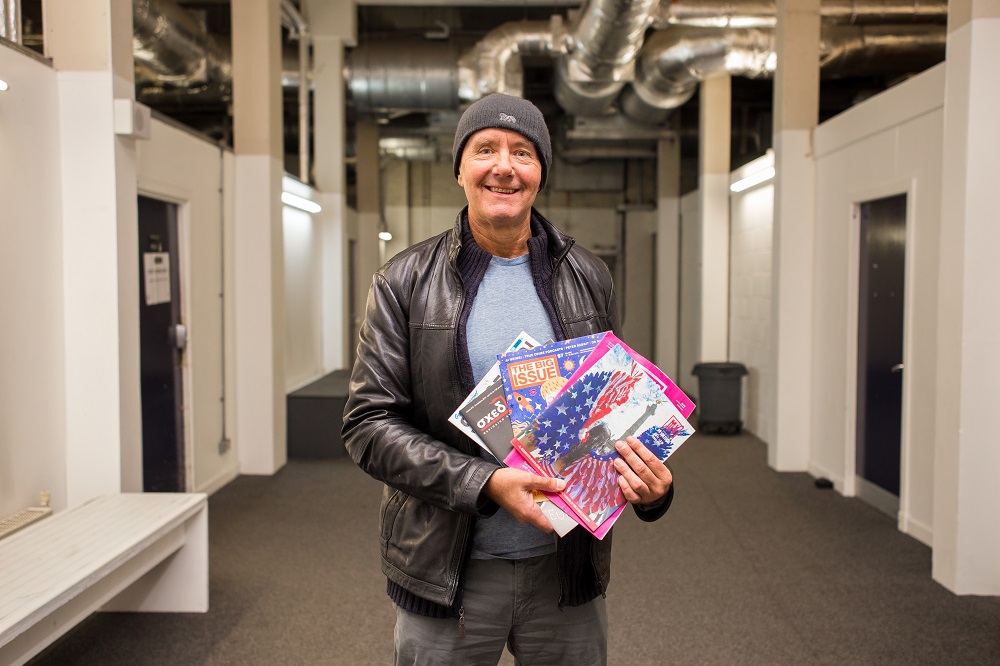
You’ve lived in America for a long time now. What’s your perception of street papers, and street paper vendors, there – is it as visible as it is here?
When I lived in Chicago, I soon became a regular buyer of StreetWise [the local street paper]. I quickly realised that, while they were slightly different, it fulfilled a similar role to that which The Big Issue played. I got friendly with Clint, my local vendor and worry for him and the likes of him in the vicious winter weather.
You live in Miami now so, figuratively and literally, you are in close proximity to the recent mass shooting in Parkland, Florida. What’s your feeling about the way the gun control debate recently has turned, and just about the general political turmoil that seems to have descended on society?
The Parkland kids are doing what the youth have to do – mobilise against the continuing insanity of their elders, who will be dead soon and seem hell bent on bequeathing them the biggest mess possible. It’s ludicrous that a 95-year-old can vote and a 14-year-old can’t.
I don’t think you can describe what’s been happening politically as madness – in some ways it’s a natural reaction to a fundamental long form change in a techno-economic system and a way of life.
Being ‘active’ on Twitter is like being active with a TV handset on the couch
What about your experience of the approach to dealing with homelessness in Florida, and the rest of the US?
I’ve seen homeless people hassled by cops and moved on, particularly in downtown shopping areas. But this is not uncommon in the UK either. There is a huge flight of homeless people from the northern cities into Miami in winter, simply because it’s possible to survive on the streets.
You’re pretty active on Twitter – what do you get out of using social media as a platform, especially since you already have the platform of being an extremely successful writer?
I vent on Twitter but I don’t take it particularly seriously. It only becomes a thing if a lot of people mobilise. Otherwise being ‘active’ on Twitter is like being active with a TV handset on the couch.
[Trainspotting character] Spud has dealt with homelessness, or indeed many of the trials that those who experience homelessness for real face, and he has been portrayed in an extremely nuanced way. Do you think people who are dealing with homelessness, and everything that surrounds it, in reality are given the same chance to be treated as a fully-rounded human being?
You want your characters to be as real and recognisable as possible. He’s one of my favourite characters and his tragedy is that he knows exactly what is happening to him but can do nothing about it.
It is important to tell everyone’s story. They are a cornerstone of our humanity and culture. If we stop telling stories, we are done.
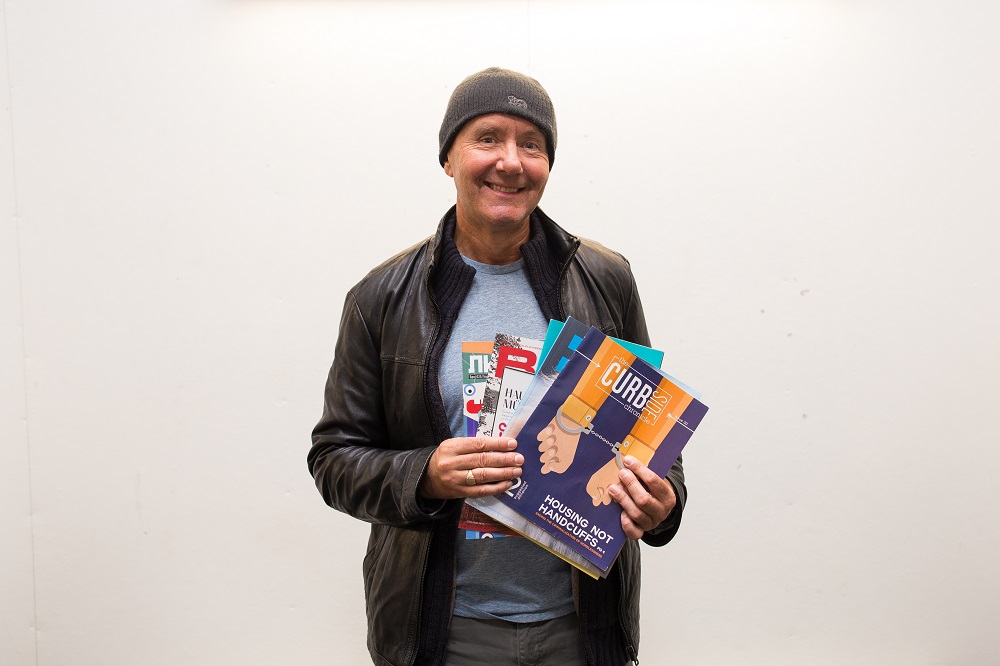
Obviously street papers work with people who are currently experiencing, or on the brink of experiencing, homelessness. What is home to you?
It’s where I can choose to shut the door on the world or open it up to it. That’s the fundamental choice. That’s the fundamental right of all human beings.
I’m formed as a writer and person by Edinburgh and Leith. It never leaves me, and I can never leave it.
Following the success of the original Trainspotting movie, have you felt that, back when you actually wrote the story, you had some kind of moral responsibility towards drug addiction?
Your responsibility to drug addiction as an issue is the same as any other issue – you need to tell the truth as it appears to you as a writer. It’s not the only truth, of course, but you hope it’s one others share.
Your new book Dead Men’s Trousers is the fifth focused on this group of characters – do you still love writing these characters after such a long time with them?
Yes – very much. You have to acknowledge their fictional journey though. I could knock out a Trainspotting novel every year based on those characters but franchise building isn’t for me. Too many other things to write about.
INSP members can download this story from the News Service here.





